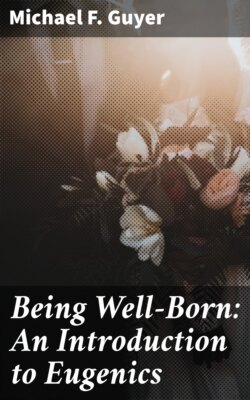Читать книгу Being Well-Born: An Introduction to Eugenics - Michael F. Guyer - Страница 3
На сайте Литреса книга снята с продажи.
PREFACE
ОглавлениеTable of Contents
One of the most significant processes at work in society to-day is the awakening of the civilized world to the rights of the child; and it is coming to be realized that its right of rights is that of being well-born. Any series of publications, therefore, dealing primarily with the problems of child nature may very fittingly be initiated by a discussion of the factor of well-nigh supreme importance in determining this nature, heredity.
No principles have more direct bearing on the welfare of man than those of heredity, and yet on scarcely any subject does as wide-spread ignorance prevail. This is due in part to the complexity of the subject, but more to the fact that in the past no clear-cut methods of attacking the manifold problems involved had been devised. Happily this difficulty has at least in part been overcome.
It is no exaggeration to say that during the last fifteen years we have made more progress in measuring the extent of inheritance and in determining its elemental factors than in all previous time. Instead of dealing wholly now with vague general impressions and speculations, certain definite principles of genetic transmission have been disclosed. And since it is becoming more and more apparent that these hold for man as well as for plants and animals in general, we can no longer ignore the social responsibilities which the new facts thrust upon us.
Since what a child becomes is determined so largely by its inborn capacities it is of the greatest importance that teachers and parents realize something of the nature of such aptitudes before they begin to awaken them. For education consists in large measure in applying the stimuli necessary to set going these potentialities and of affording opportunity for their expression. Of the good propensities, some will require merely the start, others will need to be fostered and coaxed into permanence through the stereotyping effects of proper habits; of the dangerous or bad, some must be kept dormant by preventing improper stimulation, others repressed by the cultivation of inhibitive tendencies, and yet others smothered or excluded by filling their place with desirable traits before they themselves come into expression.
We must see clearly, furthermore, that even the best of pedagogy and parental training has obvious limits. Once grasp the truth that a child’s fate in life is frequently decided long before birth, and that no amount of food or hospital service or culture or tears will ever wholly make good the deficiencies of bad “blood,” or in the language of the biologist, a faulty germ-plasm, and the conviction must surely be borne home to the intelligent members of society that one thing of superlative importance in life is the making of a wise choice of a marriage mate on the one hand, and the prevention of parenthood to the obviously unfit on the other.
In the present volume it is intended to examine into the natural endowment of the child. And since full comprehension of it requires some understanding of the nature of the physical mechanism by which hereditary traits are handed on from generation to generation, a small amount of space is given to this phase. Then, that the reader may appreciate to their fullest extent the facts gathered concerning man, a review of the more significant principles of genetics as revealed through experiments in breeding plants and animals has been undertaken. The main applications of these principles to man is pointed out in a general discussion of human heredity. Finally, inasmuch as all available data indicate that the fate of our very civilization hangs on the issue, the work concludes with an account of the new science of eugenics which is striving for the betterment of the race by determining and promulgating the laws of human inheritance so that mankind may intelligently go about conserving good and repressing bad human stocks.
In order to eliminate as many errors as possible and to avoid oversights I have submitted various chapters to certain of my colleagues and friends who are authorities in the special field treated therein. While these gentlemen are in no way responsible for the material of any chapter they have added greatly to the value of the whole by their suggestions and comments. Thus I am indebted to Professor Leon J. Cole for reading the entire manuscript; to Professors A. S. Pearse and F. C. Sharp for reading Chapter VII; to Professor C. R. Bardeen for reading special parts; to Doctor J. S. Evans for reading Chapter VI and part of V; to Doctor W. F. Lorenz, of the Mendota Hospital, for reading Chapter VIII; to Judge E. Ray Stevens for reading Chapter IX, and to Helen M. Guyer for several readings of the entire manuscript.
Grateful acknowledgment is made to all of these readers, to various publishers and periodicals for the use of certain of the illustrations, to the authors of the numerous books and papers from which much of the material in such a work as this must necessarily be selected, and to my artist, Miss H. J. Wakeman, for her painstaking endeavors to make her work conform to my ideas of what each diagram should show.
M. F. G.
